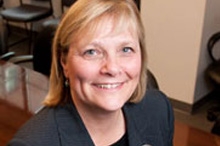

Laura Anderko is being honored as a Champion of Change for her work on the front lines to protect public health in a changing climate.
My birthday is Earth Day. I have at times wondered if this predisposes me to embrace environmental issues a bit more tightly than most. I remember at early age thinking about why society needed to take its relationship with the environment more seriously. Dirty water and air were choking the life out of fish, birds, and humans. Growing up in Chicago, I can remember the feeling of loss and sadness as buses spewed clouds of black smoke into the neighborhood. The Clean Air Act of 1970 brought relief and improved health.
As a student nurse in the 1970s (the decade when Earth Day was established), our curriculum was completely void of content about the connection between our earth and our health. As I grew professionally as a public health nurse, I actively explored those connections. I taught what I learned to nurses, student nurses, and the public, conducted research about those connections, and finally began advocating for a cleaner, healthier planet for future generations.
Partnerships between the health sector and other climate change-related sectors and a focus on the common good are critical in public health and have been key to my success educating and advocating for a “health in all policy” approach, particularly in areas such as clean energy and the environment. Few people understand that health is often not a consideration in policy. Establishing partnerships with other sectors broadens the lens for viewing the effects of climate change. Even some climate experts are unfamiliar with the range of health consequences of climate change. Although many experts are familiar with the link between heat, ozone, pollen, and poor air quality resulting in increased risks for asthma, few understand other potential health impacts. For example, as temperatures increase, the geographical range for vector-borne disease such as malaria and dengue fever can expand too. The scale of health risks is on par with the enormity of climate change!
Along the way, I have been humbled by the knowledge and passion of individuals and the commitment behind many organizations that work tirelessly to connect the dots and advocate for a cleaner environment and healthier world. There have been many climate partners in my work to address the potential impacts of climate change on the public’s health:
- The Alliance of Nurses for Healthy Environments, brought nurses together from across the nation to integrate environmental health content into nursing curriculum, practice, and research, and to support nurses to promote healthy environmental policy
- The Georgetown Environment Initiative and the Georgetown Climate Center, created interdisciplinary approaches to partner with public health professionals and community residents to design climate change adaptation plans, especially in poor communities
- The American Lung Association, Big Shoulders, the Catholic Health Association, Climate Reality Project, Health Care without Harm, and the National Resources Defense Council have provided numerous opportunities to more effectively communicate the health risks associated with climate change and ways to reduce them through webinars, op-eds, public health reports, testimony, and community educational programs
- The unsung heroes of governmental agencies who have collaborated to translate the evidence into meaningful public health action. Along with students, I have worked closely with the District of Columbia Department of Health to expand the capacity of an environmental public health tracking system that links weather and health data, and to use this data to assist families to take protective action against asthma risks.
The enormity of global climate change and its impacts on each and every living thing can conjure a feeling of hopelessness. It is through working together to educate and advocate that we can restore hope to the conversation. Climate change is more than an economic issue. Climate change is a health issue. In President Obama’s address on climate change and clean energy at Georgetown University in June, he remarked that we didn’t have to decide between the health of our children and health of our economy. We must be vigilant in communicating and addressing the global health impacts of climate change. I am honored to receive the Champions of Change award and grateful to Georgetown University for its continued support of my work. It is my hope that society will continue to work collectively to ensure a cleaner, healthier earth for future generations.
Laura Anderko is the Robert and Kathleen Scanlon Endowed Chair in Values Based Health Care at Georgetown University School of Nursing & Health Studies.


